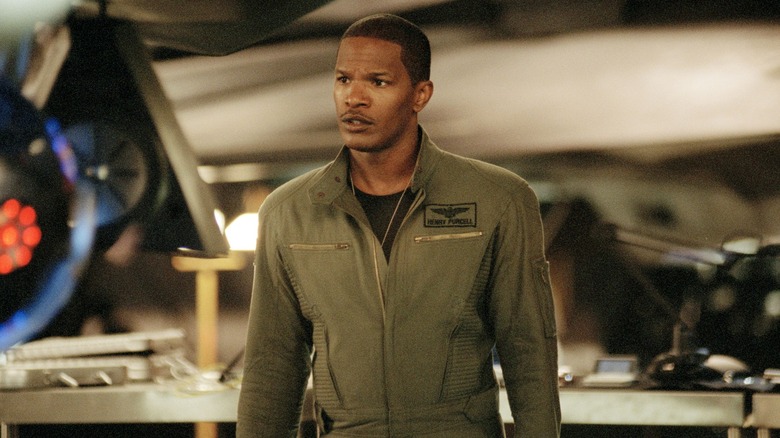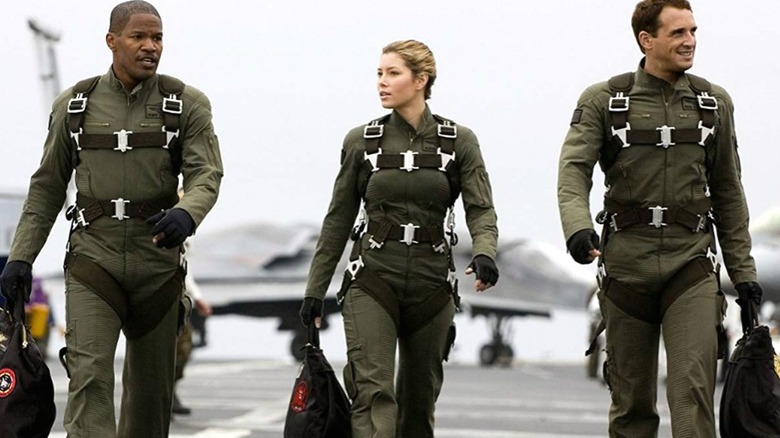Jamie Foxx Followed His Oscar Win With This Maligned Sci-Fi Flop
Taylor Hackford's "Ray," the 2004 biography that chronicles the life of legendary musician Ray Charles, closely follows the conventions of the genre. It wears its sentimentality on its sleeve, the kind that often accompanies biographical portraits of geniuses, and uses embellishments to heighten its dramatic stakes. Despite these genre trappings, "Ray" emerges as a soulful, spirited drama because of Jamie Foxx's central performance, which oozes charisma. Foxx disappears into the role of the titular boundary-pushing artist, bringing the eccentricities of the man to life to convincing ends. The success of "Ray" can also undoubtedly be attributed to Foxx, who won a Best Actor Oscar for his work in the film. Apart from being nominated in more than five categories at the Academy Awards, "Ray" also won an Oscar for Best Sound Mixing (which is clearly deserved).
"Ray" is not the only film to showcase Foxx's incredible capacity to embody dramatic roles, but it definitely helped cement his credibility as a performer in combination with "Collateral." The latter, directed by Michael Mann, also came out in 2004 and features a gripping (not to mention Oscar-nominated) performance by Foxx, who holds his own against Tom Cruise as the movie's intense, sadistic antagonist. One would've hoped that Foxx could keep his hot streak going, but alas, his first post-"Ray" film was both a critical and commercial failure that wound up becoming one of the biggest box office flops in cinematic history.
This maligned project was Rob Cohen's "Stealth," a "Top Gun"-esque sci-fi action flick that centers on three fighter pilots tasked with building a robotic stealth aircraft. So, what exactly went wrong with "Stealth," and why did it bomb so hard?
Jamie Fox-starrer Stealth sports an uninspired premise
Spoilers for "Stealth" to follow.
The plot of "Stealth" takes place in the near future, but every technological innovation championed by the film's central characters completely defies logic. Scientific jargon is thrown around quite liberally, but the moment you really start to think about the film's sci-fi concepts, they crumble like a house of cards. The experts pushing for such innovation are fighter pilots Lt. Ben Gannon (Josh Lucas), Lt. Kara Wade (Jessica Biel), and Lt. Henry Purcell (Foxx), who are chosen to be a part of a prestigious U.S. Navy program. The program in question has developed the F/A-37 Talon, a single-seat fighter bomber with enhanced, customized characteristics, where the next step is to install an AI named the "Extreme Deep Invader" (EDI) to further streamline this invention.
At first glance, nothing seems to be wrong with the premise, which feels pretty run-of-the-mill by dystopian sci-fi standards. If anything, the concept of an autonomous AI (similar to the one in "Mission: Impossible — Dead Reckoning") "learning" empathy, morality, and discernment from a group of human pilots could easily be molded into something complex and thought-provoking. However, "Stealth" fails its human characters by making them shallow in a way that feels at odds with the self-serious subject matter at hand. Moreover, every mission they do together — including one where they miraculously fly to Rangoon within a really short time and come up with an illogical rescue plan — stretches the limits of suspension of disbelief. Nothing that Gannon, Wade, and Purcell do or say ever feels like something that would actually happen in reality, and this sentiment persists throughout.
You might be wondering, "Sure, 'Stealth' is a bit uninspired, but is it fun?" Unfortunately, it isn't, even during the moments when characters indulge in some levity during a trip to Thailand to escape all the rule-breaking they have done. In the end, all the expensive marketing that went into "Stealth" being promoted as the big summer blockbuster of 2005 was in vain. The film lacked both the juice and the substance to lay claim to such a title.

